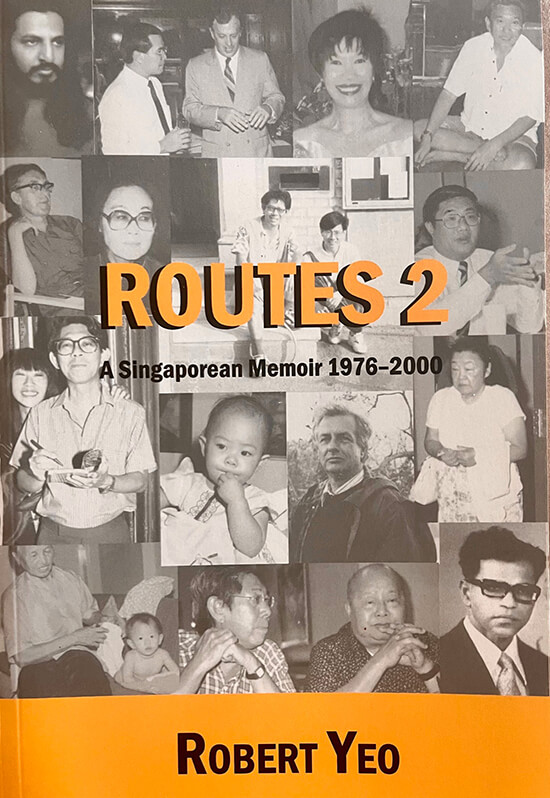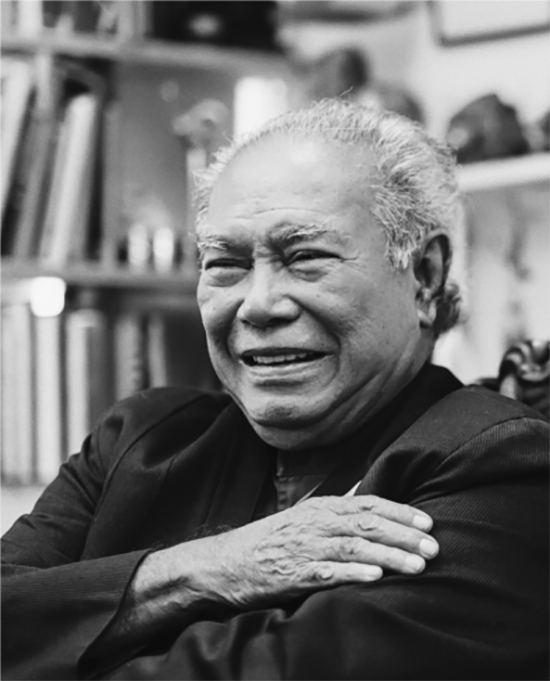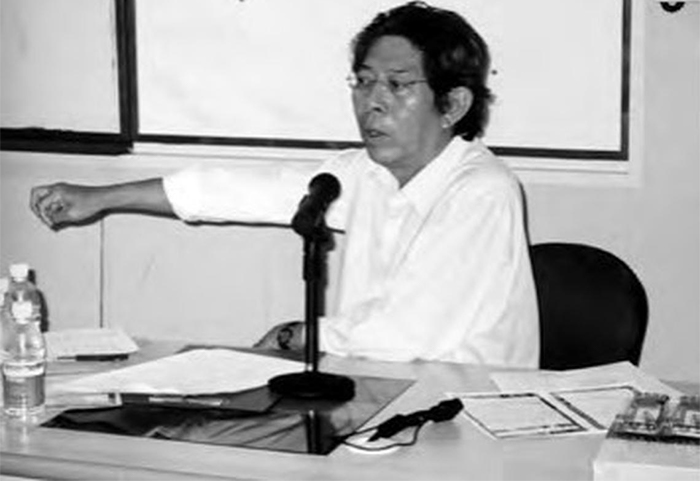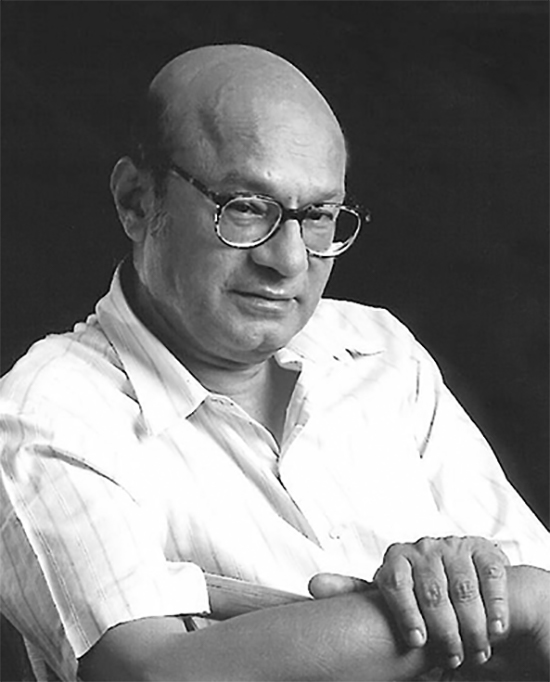Fraternizing with Singaporean writers
Robert Yeo’s Routes 2: A Singaporean Memoir 1976-2000, recently published by Word Image Pt. Ltd., is a sequel to his first Routes memoir covering 1940-75. He’s been my oldest Singaporean writer-friend, the first of many throughout five decades. We met in September 1978 in Iowa City when we started our fellowship at the International Writers Program.
Having to share a two-room apartment, we quickly agreed that since I could cook and he couldn’t, then he’d have to do the dishes. I eventually threw in a bonus. I’d cut his hair. Mine didn’t need scissors, since I was growing it long. It had reached my shoulders when Robert took a photo of me aboard a Mississippi River boat on a cruise. I used it as a mug shot for the back cover of my first book of poetry, Sea Serpent, which came out in 1980.
Yeo expresses disgruntlement over caustic observations by Paul Theroux, who had taught for years in Singapore and called it ‘a loathsome place.’
In a way, he has just paid me back in kind. The front cover of his latest book sports a montage of photos of his family, friends, and colleagues. I appear in a solo pic on the upper right-hand corner.
A poet, dramatist, and fiction writer, Robert already had two poetry collections when we met. He had also traveled considerably around our region. His inherent nationalism and interest in politics took him beyond literary engagement.

Early in Routes 2, he mentions initial influence from Edwin Thumboo, the acknowledged grandfather of Singapore’s English writers, who fraternized with a Filipino counterpart, eventual National Artist for Literature F. Sionil Jose. Also cited are Singaporean novelist Go Poh Seng and fictionist colleague Catherine Lim.
Yeo expresses disgruntlement over caustic observations by Paul Theroux, who had taught for years in Singapore. In The Great Railway Bazaar, Theroux had written: “… I believed it to be a loathsome place: many of my students thought so too and they couldn’t imagine why anyone would want to stay there…”

Robert took umbrage. “In subsequent travel books where he has occasion to mention Singapore, as it prospered in the sixties and seventies, and beyond, Theroux would continue his diatribes. Compare this with Deng Xiaoping, China’s paramount leader, who came to Singapore in November 1978, just one year after Theroux’s 1977 Penguin edition was published, to see what he could learn from the city-state.”
In 1978 Robert first traveled to China on an educational tour. Later in the year, it was Iowa City for four months of the IWP.

“It was a bumper year for the Program, with thirty-five writers from many countries. Some came alone, others with their spouses or girlfriends and most of us were given accommodation in the spacious Mayflower Apartments on Dubuque Street overlooking the Iowa River. The singles were asked to share apartments and I had the good fortune to stay with Alfred Yuson of the Philippines. It was very likely part of the good sense of the IWP organizers to figure out that two guys from Southeast Asia could get along well.”
Robert also writes about how I turned out to be an excellent cook, albeit took my time in our shared kitchen.
“He kept late nights and got up late in the morning. Sometimes, when I went to bed late or could not sleep, I could hear him typing next door, rapidly and with two fingers. I wrote a poem about him called ‘Lifestyle’ in praise of someone whose ways were rather different from mine.
“‘Lifestyle’ / For Alfred Yuson: Night is your day. And if not all night/ Then most of it. You stir at noon./ Midnight finds you in your prime/ Tossing unrhymed poems to your late father/ Your index fingers rattling the keys.// …”
But Robert understandably errs with long-time recollection. He relates that his wife Esther eventually joined him, so that I had to transfer to another apartment. The fact is that my partner Sylvia Mayuga flew in with our five-year-old son Aya by early October, so that it was Robert we threw out, haha! He then asked Esther to join him, which she did soon enough.
An entrenched memory of Iowa was of the night Aya and I first experienced heavy snowfall by late November. We started playing with snowballs right outside Mayflower, when we spotted Esther also about to rush out from the lobby. I hurled a snowball towards the glass door she was about to open, and she instinctively ducked while still indoors. Aya and I were still in stitches by the time she stepped out to join in the fun.
In 1979 when I first visited Singapore to co-write the APA Insight Guide to the Philippines, I met Dr. Gopal Baratham, a neurosurgeon who was just starting to write short fiction. He became an outstanding author.

Subsequent visits involved attendance at literary events. Kirpal Singh was another remarkable writer who became a dear friend. Some ten years ago, he arranged for Freddie Aguilar to speak on the evolution of Anak at Singapore Management University (SMU). I came in as part of the package to write about the event, and enjoy a post-performance dinner with Kirpal and Freddie.
Kirpal sent his SMU students as fellows to the Silliman University National Writers Workshop. He himself participated as a panelist. At some point, thanks to him, Rowena Tiempo Torrevillas of Iowa City and I found ourselves together at a writers’ gig in Singapore. A similar privilege was participation in the company of Paul Theroux (yes!), as well as Robin Hemley, UI’s director of the nonfiction writing program, who in the 1990s brought his students to Dumaguete to join the summer workshop.
Younger writers Alvin Pang, Felix Cheong, and Aaron Lee visited Manila in 2001 in time to witness EDSA Dos even as we hosted their readings at UP, Ateneo, and cafe-bars. We produced Love Gathers All: The Singapore-Philippines Anthology of Love Poetry. Cross-attendance in writers’ festivals and workshops ensured the furtherance of literary camaraderie.
Alvin Pang also paneled in Dumaguete, besides writers’ events organized by DLSU. Whenever he helps produce a thematic anthology of international poetry, Alvin makes sure to invite Marjorie Evasco and me to join in, and to pass the word on. His last two books were Uninterrupted Time (prose poetry) in 2019 and Diaphanous, co-written with UK’s George Szirtes in 2023.
Felix Cheong has been on a roll of late. He has authored other poetry collections since his first, Temptation and Other Poems in 1998. He’s moved on to adult fiction and graphic novels, such as the best-selling The Showgirl and the Minister. He is married to a Filipina.
No visit of mine to Singapore ends without having a lovely dinner hosted by poet-lawyer Aaron Lee. Among his books are the poetry collection Coastlands of 2014 and anthologies such as No Other City: The Ethos Anthology of Urban Poetry.
Filipino writer Eric Tinsay Valles joined the Singapore literary community over a decade ago. Besides poetry books such as After the Fall: Dirges Among Ruins in 2014, he has produced multi-genre anthologies that included Filipino and Singaporean contributors, such as Get Lucky in 2015.
Other notable Filipino writers who have long resided in Singapore, while authoring prize-winning books of fiction, include FH Batacan, with her 2017 novel-turned-film Smaller and Smaller Circles, and recently, her latest crime novel, Accidents Happen. Noelle de Jesus has authored best-sellers such as Blood: Collected Stories (2015, Ethos Books) and Cursed and Other Stories (2019, Penguin Random House SEA).
Poet Lawrence Y. Ypil, who lectures at Yale NUS, authored The Experiment of the Tropics in 2019. In 2022, he collaborated on Ventanilla: Duet with Brit historian Martin Dusinberre. Other Pinoy expat writers in the Lion City are Tara Sering, Mayo Uno Martin, Migs Bravo Dutt, Cathy Candano, Rodrigo de la Peña, Victor Ocampo. Claire Betita de Guzman, Michelangelo Samson, and Timi Siytangco.
Gopal Baratham left us early. Kirpal, Robert and I are in our 80s. The last few times I’ve seen Robert in Singapore, it was over beers and great steak at a dinner club. We still look back at our early writing days together, while appreciating the influx of younger writers who continue the vigorous fraternity of authors bound together by a language not originally our own. The brotherhood remains.


